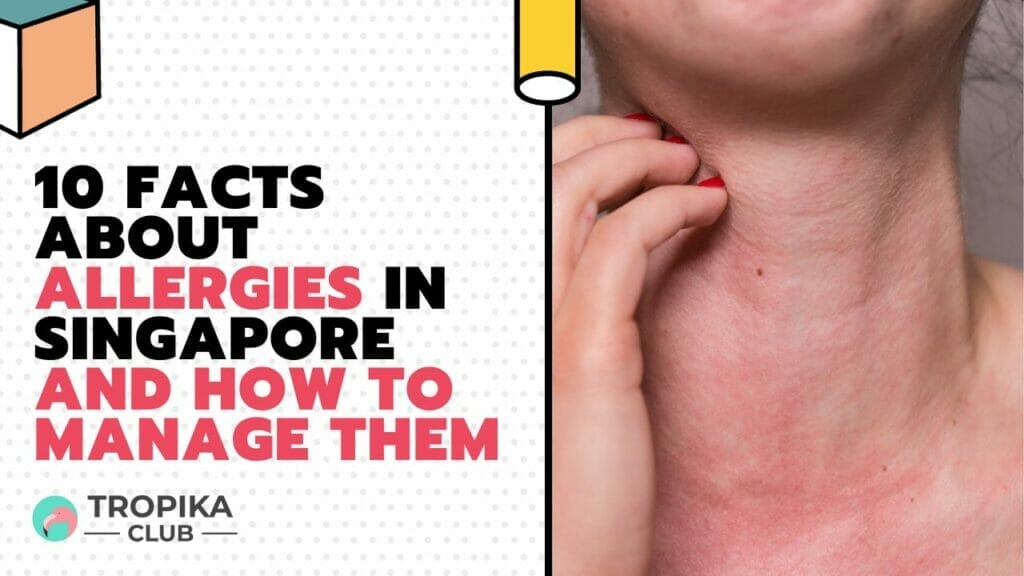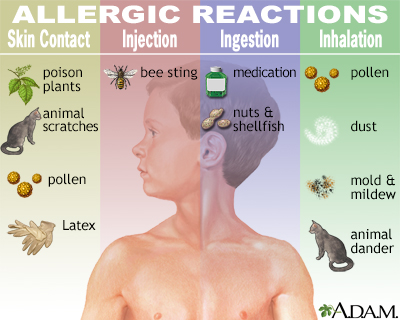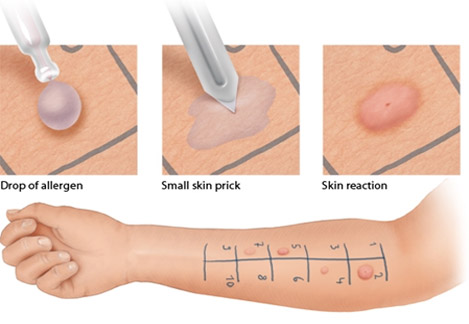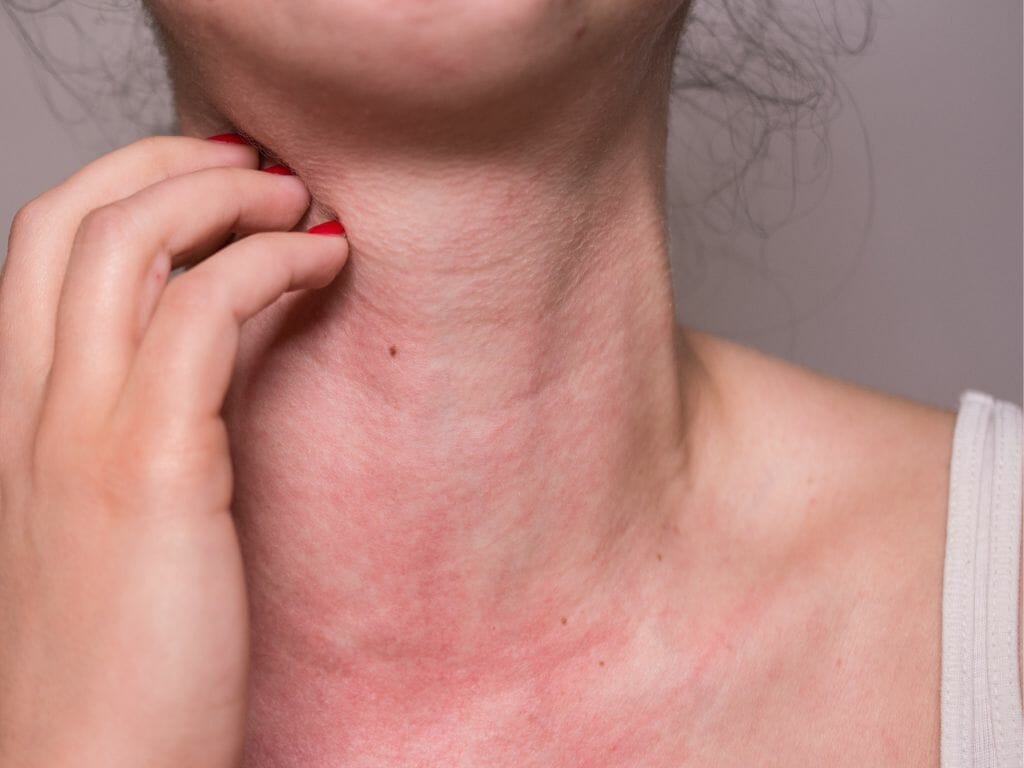10 Facts About Allergies in Singapore and How to Manage Them
Introduction
Allergies are a common problem for many people in Singapore. According to a study, about one in four adults in Singapore suffers from at least one type of allergy. Allergies occur when the immune system reacts to substances that are normally harmless, such as pollen, dust mites, food or animal dander. These substances are called allergens, and they can trigger various symptoms such as sneezing, itching, rashes, swelling or even anaphylaxis, a life-threatening condition that requires immediate medical attention.
If you are one of the many people who have allergies, or if you want to learn more about this condition, here are 10 facts that you should know:

Table of contents
- Introduction
- No Time to Read? Here’s a Snappy Summary of This Article
- 1. Allergies can develop at any age
- 2. Allergies are more prevalent in urban areas
- 3. Allergies can affect different parts of the body
- 4. Allergies can cause various complications
- 5. Allergies can be diagnosed by various tests
- 6. Allergies can be treated by various methods
- 7. Allergies can be prevented by various measures
- 8. Allergies are not contagious
- 9. Allergies are not curable
- 10. Allergies are not a sign of weakness
- Conclusion
- Meanwhile, Check Out Tropika Club’s Ecosystem of Websites
No Time to Read? Here’s a Snappy Summary of This Article
- Singapore’s Sneezing Secrets: Discover common allergies like dust mites, shellfish, and how they thrive in our tropical paradise.
- Haze and Allergies: Uncover how Singapore’s famous haze worsens allergies, especially those related to respiratory issues.
- Allergy Heroes: Learn how lifestyle changes, air purifiers, and medications can help you combat allergies and enjoy the Lion City.
- Weathering the Allergy Storm: Find out about unique Singaporean allergens and their impact on your health.
- Outgrowing Allergies: Is it possible? We delve into the chances of bidding your allergies farewell in Singapore’s climate.
- Allergy Allies: Locate allergy specialists and clinics to help you breathe easy in the city’s vibrant healthcare scene.

1. Allergies can develop at any age
You may think that allergies only affect children, but this is not true. Allergies can develop at any age, even in adulthood. Some people may outgrow their childhood allergies, while others may develop new ones later in life. The reasons for this are not fully understood, but some factors that may influence the development of allergies include genetics, environmental exposure, hygiene and lifestyle.
2. Allergies are more prevalent in urban areas
Studies have shown that allergies are more common in urban areas than in rural areas. This may be due to the higher levels of pollution, stress and allergens in the city environment. Moreover, urban dwellers may have less exposure to natural microbes and parasites that can help regulate the immune system and prevent it from overreacting to harmless substances.

3. Allergies can affect different parts of the body
Allergies can affect different parts of the body depending on the type and route of exposure to the allergen. For example, allergic rhinitis (hay fever) affects the nose and eyes when you breathe in pollen or dust mites; allergic asthma affects the lungs and airways when you inhale allergens such as animal dander or mould spores; food allergies affect the digestive system when you eat certain foods such as peanuts or shellfish; skin allergies affect the skin when you touch or apply something that you are allergic to such as cosmetics or latex; and drug allergies affect the whole body when you take a medication that you are allergic to such as penicillin or aspirin.

4. Allergies can cause various complications
Allergies can cause various complications if they are not treated properly or promptly. Some of these complications include chronic sinusitis (inflammation of the sinuses), otitis media (infection of the middle ear), eczema (dry and itchy skin), urticaria (hives), angioedema (swelling of the face, lips, tongue or throat), anaphylaxis (severe allergic reaction that can cause shock, low blood pressure, difficulty breathing and loss of consciousness) and even death.

5. Allergies can be diagnosed by various tests
Allergies can be diagnosed by various tests that can help identify the specific allergens that trigger your symptoms. Some of these tests include skin prick test (where a small amount of allergen is pricked into your skin and observed for any reaction), blood test (where a sample of your blood is analysed for antibodies against certain allergens), patch test (where a patch containing allergen is applied to your skin and checked for any reaction after 48 hours) and oral challenge test (where you are given a small amount of allergen to eat or drink and monitored for any reaction).

6. Allergies can be treated by various methods
Allergies can be treated by various methods that can help reduce your symptoms and prevent complications. Some of these methods include avoidance (where you avoid contact with the allergen as much as possible), medication (where you take drugs such as antihistamines, corticosteroids or epinephrine to relieve your symptoms or prevent anaphylaxis), immunotherapy (where you receive injections or drops of allergen extracts to gradually desensitise your immune system) and alternative therapies (where you use natural remedies such as acupuncture, herbal medicine or homeopathy to treat your allergies).
_
Read Also:
How to Effectively Deal with Your Allergy
_
:max_bytes(150000):strip_icc()/respiratory-allergies-symptoms-causes-and-treatment-5206183-5205177-final-7af9eb5916eb4a8dacf8b9bd516cad85.jpg)
7. Allergies can be prevented by various measures
Allergies can be prevented by various measures that can help reduce your risk of developing them or minimise your exposure to allergens. Some of these measures include breastfeeding (where you breastfeed your baby for at least six months to boost their immune system and protect them from food allergies), early introduction (where you introduce potential allergenic foods such as eggs, peanuts or fish to your baby before one year of age to prevent them from developing food allergies), hygiene hypothesis (where you expose yourself or your child to a moderate level of dirt, germs and parasites to train your immune system and prevent it from overreacting to harmless substances), environmental control (where you clean your house regularly, use air filters, avoid carpets and curtains, and keep your pets outside to reduce the amount of allergens in your indoor environment) and lifestyle modification (where you exercise regularly, eat a balanced diet, avoid smoking and drinking, and manage your stress to improve your overall health and immunity).

8. Allergies are not contagious
Allergies are not contagious, which means that you cannot catch them from someone else who has them. However, some allergens such as pollen, dust mites or animal dander can be transferred from one person to another through physical contact or sharing of personal items. Therefore, it is advisable to wash your hands frequently, avoid sharing utensils, towels or bedding with someone who has allergies, and cover your mouth and nose when you sneeze or cough to prevent spreading the allergens to others.

9. Allergies are not curable
Allergies are not curable, which means that there is no permanent solution to get rid of them completely. However, with proper diagnosis, treatment and prevention, you can manage your allergies effectively and live a normal and healthy life. Some people may also outgrow their allergies over time, especially if they develop them in childhood. Therefore, it is important to consult your doctor regularly and follow their advice on how to cope with your allergies.
10. Allergies are not a sign of weakness
Allergies are not a sign of weakness, which means that they do not reflect your personality or character. Having allergies does not mean that you are weak, sensitive or inferior to others. It simply means that you have a different immune system that reacts differently to certain substances. Allergies are a common condition that affect millions of people around the world, regardless of their age, gender, race or background. Therefore, you should not feel ashamed or embarrassed about having allergies, but rather embrace them as part of who you are and learn how to deal with them positively.
Conclusion
Allergies are a common condition that affect many people in Singapore. By knowing the facts about allergies, you can better understand what causes them, how they affect you, how they can be diagnosed, treated and prevented, and how they can impact your life. With this knowledge, you can take charge of your allergies and live a happy and healthy life.

FAQ FOR 10 FACTS ABOUT ALLERGIES IN SINGAPORE AND HOW TO MANAGE THEM
Q: What are the most common allergies in Singapore?
A: Common allergies in Singapore include dust mites, pollen, food allergies (e.g., shellfish), and insect stings.
Q: How can I identify if I have allergies?
A: Allergy symptoms can include sneezing, itchy eyes, hives, or digestive issues. Consult a doctor for proper diagnosis.
Q: Are there specific allergy triggers unique to Singapore’s environment?
A: Yes, Singapore’s humidity can contribute to mold allergies. Additionally, the haze can exacerbate respiratory allergies.
Q: Can allergies be managed through lifestyle changes?
A: Yes, managing allergies in Singapore involves reducing exposure to triggers, using air purifiers, and taking prescribed medications.
Q: Is it possible to outgrow allergies in Singapore’s climate?
A: Some children may outgrow allergies, but it varies. Consult an allergist for a personalized assessment.
Q: Where can I find allergy specialists and clinics in Singapore?
A: You can find allergy specialists and clinics in Singapore by searching online or asking for referrals from your primary care physician.

Have an Article to Suggest?
Tropika Club is always looking for new and exciting content to feature in their magazine and they value the input of our readers. If you have any noteworthy content or articles that you believe would be a great addition to Tropika Club’s magazine, we are open to suggestions and encourage you to reach out to us via email at [email protected]. By doing so, Tropika Club values your expertise and knowledge in the matter and appreciates your willingness to help. We will review your recommendations and update our list accordingly
Meanwhile, Check Out Tropika Club’s Ecosystem of Websites

Tropika Club Magazine – Tropika Club Magazine is a Singapore-based publication that features articles on a wide range of topics with a focus on local businesses and content for the region. The magazine emphasizes supporting local businesses through its #SupportLocal initiative, which includes coverage of everything from neighborhood hawker stalls to aesthetic clinics in town. In addition to highlighting local businesses, Tropika Club Magazine also covers a variety of local content, including beauty, lifestyle, places, eats, and what’s on in Singapore and the Asia Pacific region.
Tropika Club Deals – Tropika Club Deals is a leading online deals and voucher shopping site in Singapore, offering amazing discounts on beauty, wellness, and fitness products and services. It’s the perfect platform for customers who want to discover the best deals without having to commit to a specific appointment date and time. These deals are available at major beauty stores, facial salons, hair salons, and other brands in Singapore, with no minimum spend required. Choose from guaranteed discounted deals in the categories of hairstyling, hair removal, facial & aesthetics, body slimming, brows & lashes, nails & makeup, massage & spa or fitness & wellness. Tropika Club Deals is also ideal for customers who want to buy vouchers as gifts or to use for the future. So whether you’re looking to save money on your next haircut or want to treat yourself to a relaxing massage, Tropika Club Deals has got you covered with the best voucher and coupon deals in Singapore!




